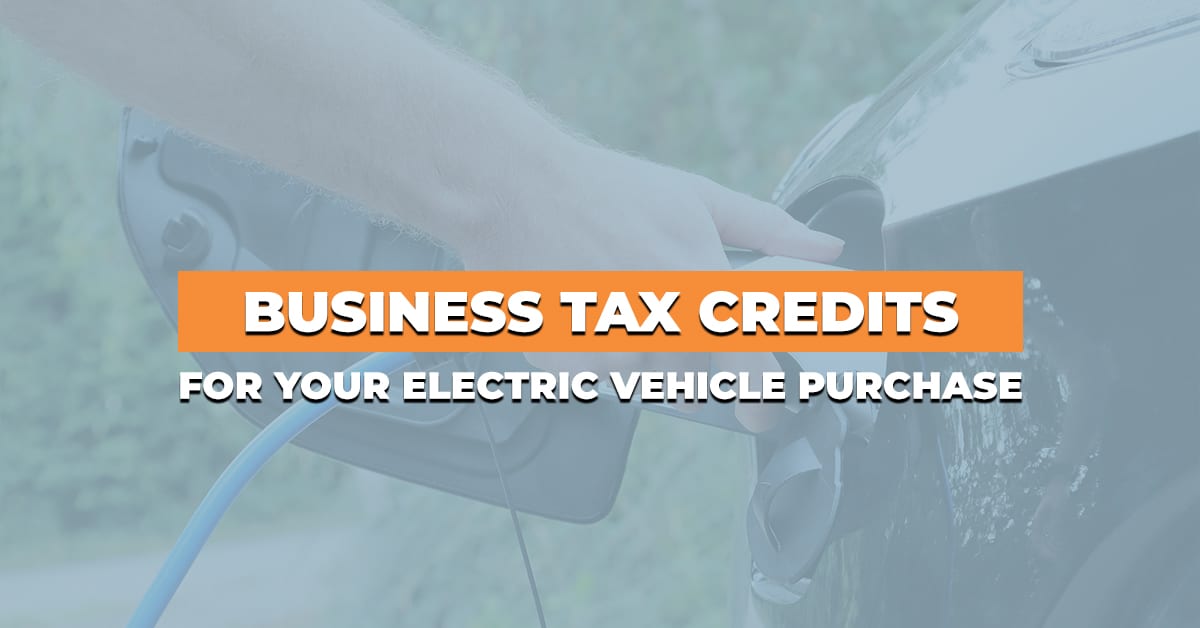Business Tax Credits For Your Electric Vehicle Purchase
If you’re thinking about buying an electric vehicle soon for business or personal use, you need to know how the Inflation Reduction Act of 2022 will impact your purchase. There’s good news if you want to purchase an electric vehicle for business use in 2023 – many of the new rules that will impact the tax credits for personal use electric vehicle purchases don’t apply to business vehicles.
How does the Inflation Reduction Act of 2022 impact electric vehicle tax credits? How are the rules different between vehicles for personal use and those for business use? Is it better to buy your new electric vehicle now, or should you wait until 2023?
Read on for more information. Questions? Contact [Accountant] now to discuss how purchasing an electric vehicle will impact your taxes.
How Does the Inflation Reduction Act of 2022 Impact EV Tax Credits?
New electric vehicles purchased after the Inflation Reduction Act of 2022 went into effect on August 16, 2022 must have had their final assembly occur in North America to qualify for the Clean Vehicle Credit. You can find a list of vehicle models that may qualify here. However, some vehicle manufacturers make cars in more than one location, so use the VIN Decoder at the bottom of the page to be certain your vehicle qualifies.
The North American assembly rules apply to all qualifying vehicles purchased from August 17, 2022 onward. A few things to keep in mind:
- The 200,000-vehicle cap on electric vehicles qualifying for tax credits will remain in effect through the end of 2022, meaning you still can’t get the tax credit if you buy a Tesla, Chevrolet, General Motors, or another vehicle model that has already sold 200,000 units in the United States.
- The 200,000-vehicle cap will be lifted starting January 1, 2023.
- For the next few years, there may not be many vehicles that meet the North American assembly rules (for example, the credits will disappear for models made by Hyundai, Kia, Porsche, and Toyota), so if you want to purchase an EV for personal use, you may want to do it by the end of 2022.
- On the other hand, the North American assembly rule won’t apply to electric vehicles purchased for business purposes, so you may want to wait until 2023 to make your purchase.
- If you ordered an electric vehicle that qualified for the credit before August 16, 2022, your 2022 credit is safe, even if you don’t take delivery of the vehicle until 2023.
What Are the Clean Vehicle Credit Rules for Personal Use 2023?
In addition to the requirement that the vehicle be built and largely sourced with materials primarily in North America (or a country the United States does free trade with), there will be new caps on the cost of the vehicle as well as income caps for EVs purchased for personal use. You will not qualify for the tax credit in 2023 if:
- You buy a sedan that costs more than $55,000 or a larger vehicle (like a van, SUV, or pickup truck) costing more than $80,000, or
- Your adjusted gross income exceeds $300,000 (married, filing jointly), $225,000 (head of household), or $150,000 (single)
How Are the Tax Credit Rules for Business Vehicles Different?
Fortunately, the above rules don’t apply to electric vehicles purchased for business use in 2023 or later.
Any depreciable business-use vehicles used primarily on public roads or that qualify as “mobile machinery” will qualify for the commercial clean vehicle tax credit if they are propelled to a significant extent by a rechargeable electric motor with a capacity of at least 7 kilowatt hours for vehicles with a gross vehicle weight rating (GVWR) of less than 14,000 pounds, or 15 kilowatt hours for vehicles with a GVWR of 14,000 pounds and over.
The credit also applies to fuel cell vehicles.
Calculating the Business Credit
The business credit is equal to the lesser of:
- The incremental cost of the vehicle, or
- 15% of the vehicle’s cost (30% if the vehicle is fully electric)
The “incremental cost” is how much more expensive the vehicle is compared to a similar non-electric vehicle.
The credit is not limited to one credit per taxpayer; you can claim multiple credits if you buy more than one electric vehicle in the same year.
Maximum Business Credit
While the maximum credit for most electric vehicles is $7,500, that maximum goes up to $40,000 for electric vehicles with a GVWR of 14,000 pounds or more (like a semi or an electric motor home).
Depreciable Property Requirement
While you don’t need to use the vehicle only for business, it must be depreciable property. Corporations don’t reduce the basis of the vehicle for personal use – they use 100% of the cost and then use IRS regulations to allocate personal use to employees.
On the other hand, a sole proprietor’s business basis equals the business-use component of the electric vehicle, which they determine using the business percentage from their mileage logs.
Also, you can’t claim the clean vehicle credit and the commercial vehicle credit for the same vehicle, so you’ll want to choose the one that benefits you the most.
New Disclosure Requirement
You will be required to include the electric vehicle’s identification number (VIN) on your business tax return to qualify for the credit.
Should I Buy an EV in 2022 or 2023?
If you want to purchase an electric vehicle for business use, you should probably wait until 2023.
If you want to buy an EV for personal use, there are a few things you should consider:
- If you’re looking for an expensive vehicle or have a high adjusted gross income, you should purchase it by the end of 2022.
- You can’t get a tax credit for the purchase of a Tesla or Chevrolet until 2023.
- You won’t be able to get a tax credit for a Toyota, Porsche, Kia, or Hyundai, or certain other vehicles starting in 2023.
Questions? Ask an Experienced Tax Accountant
Are you still confused about how the Clean Vehicle Credit will apply to your purchase of an electric vehicle? Contact us today. We’ll help with all your tax-related questions.







